Magic Box, The (1951)
“You don’t see other people; you see colors, filters, little bits of machinery, and that’s the world for you!”
|
Synopsis: |
|
Genres, Themes, Actors, and Directors:
Review: Friese-Greene (at least as portrayed here by Robert Donat) was a most frustrating individual: his single-minded devotion to cinematic invention wreaks havoc on both his marriages, forces his famil(ies) to live in dire poverty, and, tragically, prompts his three eldest sons to enlist in WWI in order to avoid being a financial burden. In a truly heartbreaking scene, Friese-Greene must comfort one of his teenage sons who has come home from school sobbing because a classmate called his father a “liar and a thief” — the former because Friese-Greene’s scientific contributions were unmentioned in the encyclopedias of the day, and the latter because of his lifetime of chronic debt and borrowing. Indeed, examples of Friese-Greene’s economic duress — and his “creative” means of getting around it — abound. In one early scene, he actually scams a woman who has come to sit for a portrait: having pawned the last of his photographic slides to earn money for his pregnant wife’s medications, he nonetheless doesn’t want to pass up the opportunity for a sale, so he asks the gullible woman for a deposit and pretends to take her photo, planning to recoup some of his slides with her money, inform her the next day that an “accident” occurred with her original shots, and then “re-shoot” them. He’s clever, to be sure, but his ploy is also skanky, and the scene is decidedly discomfiting. Friese-Greene’s chronic money troubles are all the more frustrating given that he eventually, through sheer luck and gumption, does make a name for himself, and is clearly capable of bringing in a decent income — only to lose it all by stubbornly refusing to maintain a sane balance between work and experimentation. We’re (perhaps) meant to sympathize with his drive for innovation, given that he openly lambastes his business partner for caring only about money (doesn’t he realize that without inventors like him, there wouldn’t be any products to peddle?!), but in the meantime, his first wife becomes literally ill with worry, and eventually dies, while his second wife finally leaves him in order to support herself and her sons. Screenwriter Eric Ambler — working from a biography by Ray Allister — should probably be commended for not shying away from the uglier truths of Friese-Greene’s life, yet the end result is that we don’t really want to feel much appreciation for this somewhat pathetic and misguided — albeit undeniably hardworking and visionary — dreamer. I’m of two minds about Donat’s performance: while he’s excellent at portraying Friese-Greene’s single-minded devotion to his pursuits, once he’s an older man he seems to be trying a little bit too hard — a la Mr. Chips — for sympathy. Faring better are his two wives, played with gusto by Margaret Johnston (who narrates the first flashback sequence of the film) and Maria Schell, who, for better or for worse, remains loyal to her husband until the day she dies. Most interesting of all, however, is the behind-the-scenes look we get at Friese-Greene hard at work in his laboratory: the sequence in which he finally tries out his new “moving pictures camera” — with Hyde Park coming to life inside his building — is genuinely moving, and reminds one how innovative and exciting this art form we now take for granted once was. Redeeming Qualities and Moments:
Must See? Links: |
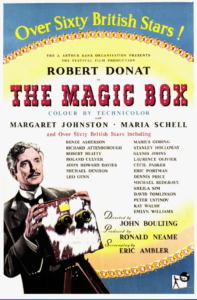
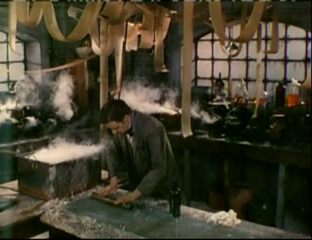

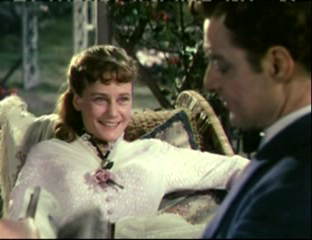
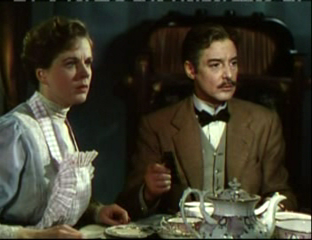
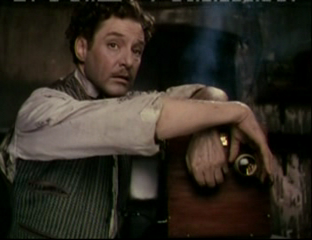
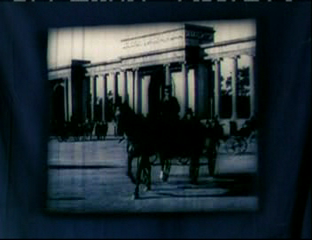

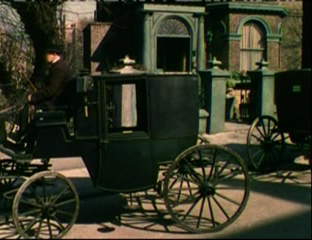
One thought on “Magic Box, The (1951)”
Not a must.
Here we go again with the search for truth in a biopic. Because, in this case, there is such general dispute (as is true of the film’s source material) regarding what Friese-Greene did and did not do, it becomes extremely difficult to have an opinion of this film at all.
Though I must say I’m impressed with Johnston’s rather understated performance as the second wife. She doesn’t really get all that much central focus but she does manage to convey the heartache of a woman in love who, nevertheless, realizes she’s fighting a losing battle re: her husband’s ‘mistress’ (his work).
There is one particularly silly sequence. Friese-Greene and his first wife are seen in a final rehearsal as part of a choral group. As ‘soloist’ for the recital, F-G basically has one line to sing. On the day of performance, F-G becomes so immersed in a work-related meeting earlier in the day that he forgets all about showing up for the recital. This puts the whole group in a tizzy. (Indeed, F-G’s chair on-stage is conspicuously empty.) As his ‘solo’ nears, members of the group ridiculously whisper ‘down the alley’ to F-G’s wife, who ultimately makes the ‘shocking’ decision to sing his solo for him (!). In reality, it is highly unlikely that something like that would or could happen. If someone set to sing such an insignificant bit were missing just prior to performance, someone else would be assigned to take over for the 10 seconds required. A rather stupid scene, really.
All that said, ffs will find saving grace in ‘TMB’: the glorious work of DP Jack Cardiff. Fresh from his Oscar win for ‘The African Queen’, Cardiff is at least dealing with subject matter close to his own heart: the process of film production. I would recommend ‘TMB’ to ffs for his considerable contribution.